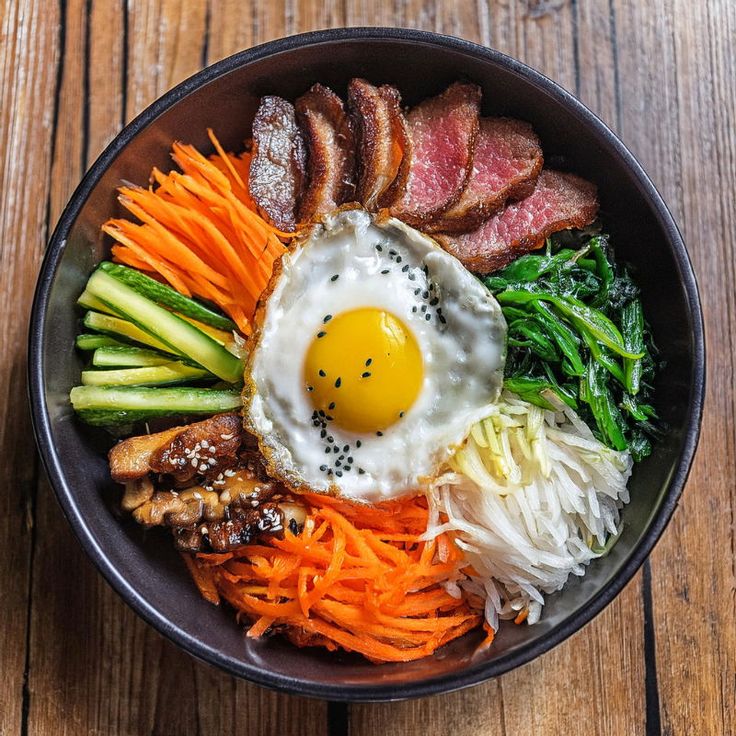Ingredients:
For the Rice:
- 2 cups cooked short-grain white rice (or brown rice)
For the Vegetables & Toppings:
- 1 carrot, julienned
- 1 zucchini, julienned
- 1 cup spinach, blanched and drained
- 1/2 cup bean sprouts, blanched
- 4 shiitake mushrooms, sliced (or any mushrooms of your choice)
- 1 cucumber, thinly sliced (optional)
- 1/2 cup kimchi (optional)
- 2 eggs, fried sunny-side up
- Sesame oil, for drizzling
- Sesame seeds, for garnish
For the Protein (optional):
- 200g ground beef, chicken, or tofu (seasoned with soy sauce, sugar, garlic, and sesame oil)
For the Gochujang Sauce:
- 2 tbsp gochujang (Korean chili paste)
- 1 tbsp sesame oil
- 1 tbsp rice vinegar
- 1 tsp sugar
- 1 tsp garlic, minced
- 1 tsp water (optional, to thin the sauce)
Instructions:
- Prepare the rice:
- Cook the short-grain rice according to package instructions and keep it warm.
- Prepare the vegetables:
- Heat a small amount of sesame oil in a pan over medium heat. Stir-fry the carrot and zucchini separately for 2–3 minutes each until slightly tender. Season with a pinch of salt and set aside.
- Sauté the mushrooms until golden and set aside.
- Blanch the spinach and bean sprouts in boiling water for 1–2 minutes, drain, and season with a dash of sesame oil and salt.
- Cook the protein:
- If using beef, chicken, or tofu, cook it in a pan with soy sauce, a pinch of sugar, garlic, and sesame oil until browned and cooked through.
- Prepare the gochujang sauce:
- In a small bowl, mix the gochujang, sesame oil, rice vinegar, sugar, and minced garlic. Adjust the thickness with water if necessary.
- Assemble the Bibimbap:
- Place a portion of rice into each serving bowl.
- Arrange the vegetables, protein (if using), and kimchi (optional) around the rice in neat sections.
- Top with a fried egg and sprinkle with sesame seeds.
- Serve:
- Drizzle with a little extra sesame oil and gochujang sauce. Mix everything together thoroughly before eating to blend the flavors.
Tips:
- You can customize Bibimbap with different vegetables, such as bell peppers, radishes, or lettuce, based on what’s available.
- Serve with additional kimchi or other Korean side dishes (banchan) for an authentic experience.
Bibimbap is a versatile dish with endless variations, making it a delicious and nutritious meal suitable for any time of the day!
